
Find Help
More Items From Ergsy search
-

What happens if Lyme disease is left untreated?
Relevance: 100%
-

What is Lyme Disease?
Relevance: 81%
-

Lyme disease: What is it?
Relevance: 80%
-
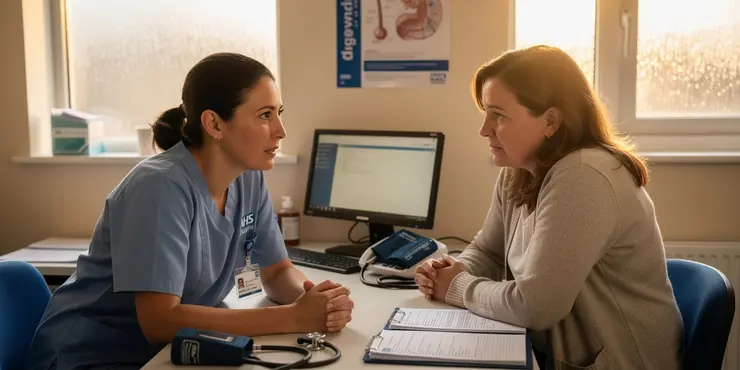
Is there a vaccine for Lyme disease?
Relevance: 76%
-

Is Lyme disease contagious between humans?
Relevance: 75%
-
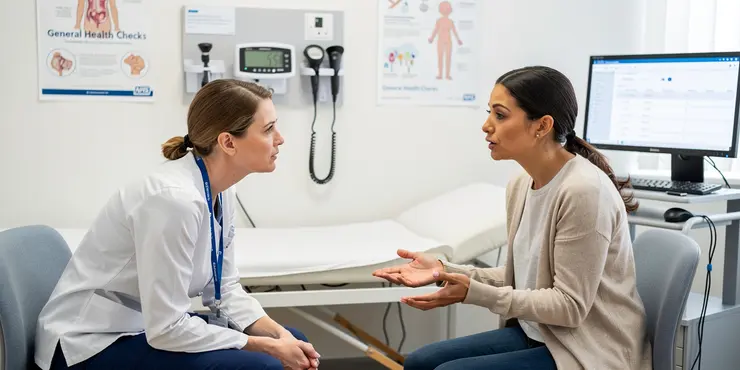
Can Lyme disease be treated?
Relevance: 74%
-

What are common symptoms of Lyme disease?
Relevance: 73%
-
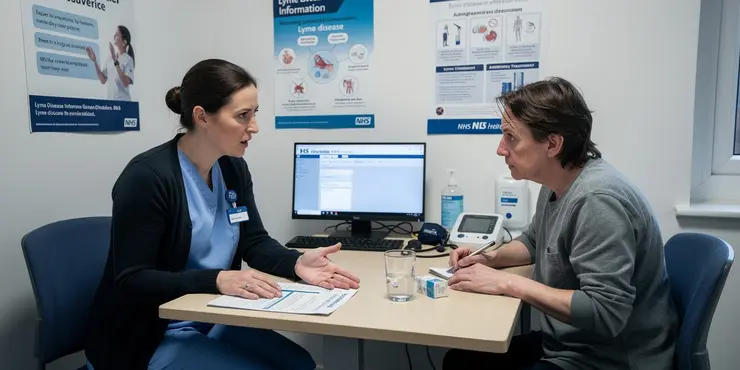
How effective are antibiotics in treating Lyme disease?
Relevance: 72%
-

How do you prevent Lyme disease?
Relevance: 69%
-
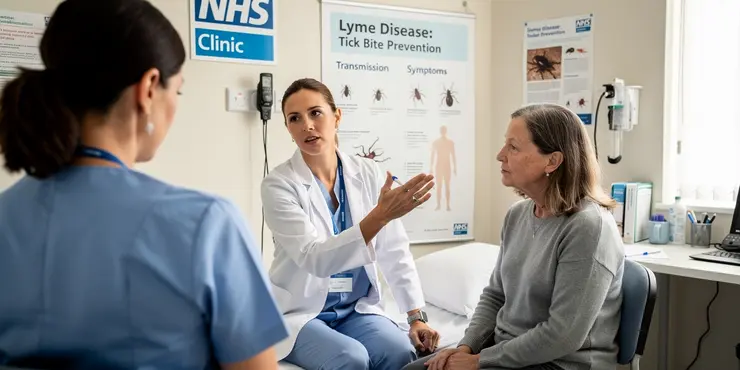
How is Lyme disease transmitted?
Relevance: 69%
-

Can pets get Lyme disease?
Relevance: 69%
-
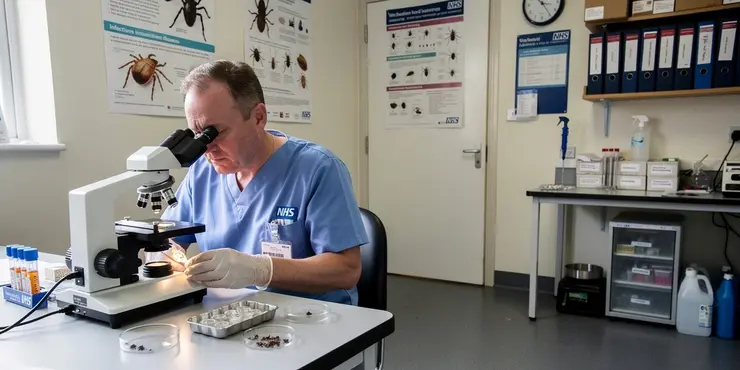
What kind of ticks carry Lyme disease?
Relevance: 68%
-

What is the first sign of Lyme disease?
Relevance: 65%
-

Where is Lyme disease most commonly found?
Relevance: 65%
-
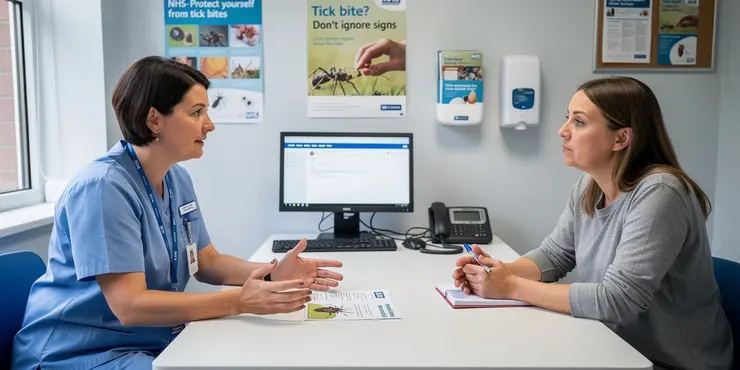
Can you get Lyme disease more than once?
Relevance: 65%
-

What tests are available for diagnosing Lyme disease?
Relevance: 64%
-
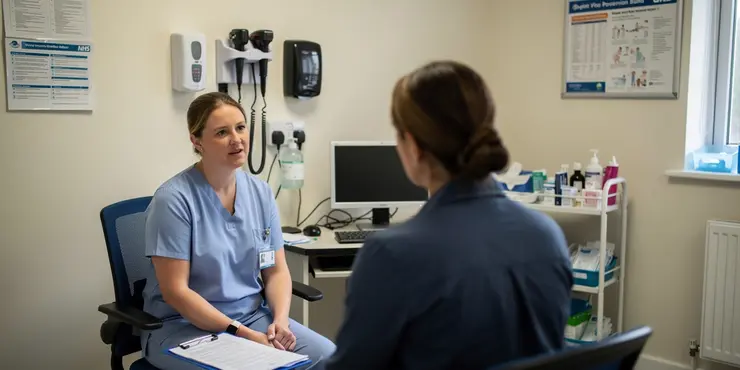
What is post-treatment Lyme disease syndrome (PTLDS)?
Relevance: 58%
-

Can Lyme disease cause long-term health problems?
Relevance: 47%
-
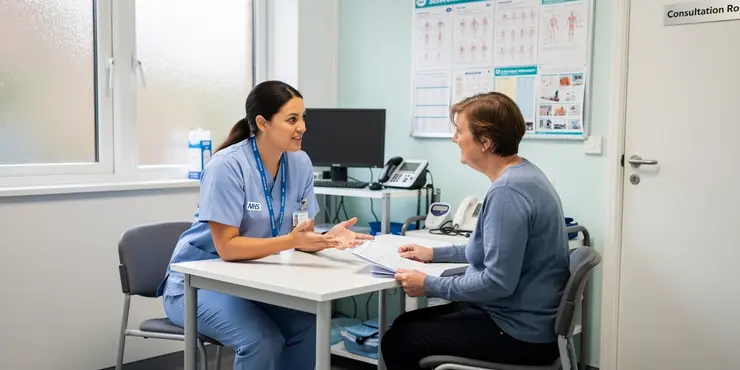
What types of antibiotics are typically used to treat Lyme disease?
Relevance: 42%
-
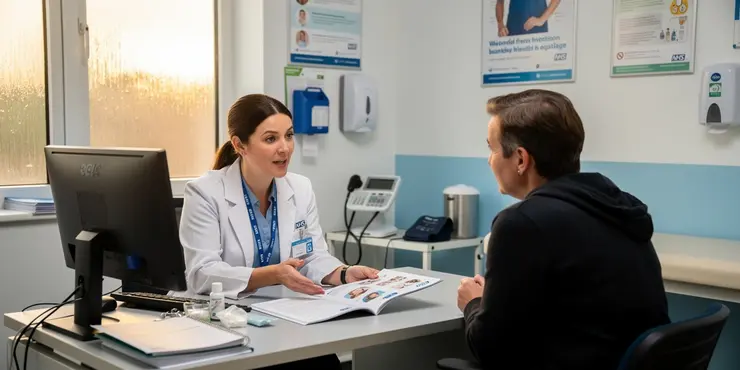
What is the mortality rate of untreated bubonic plague?
Relevance: 42%
-
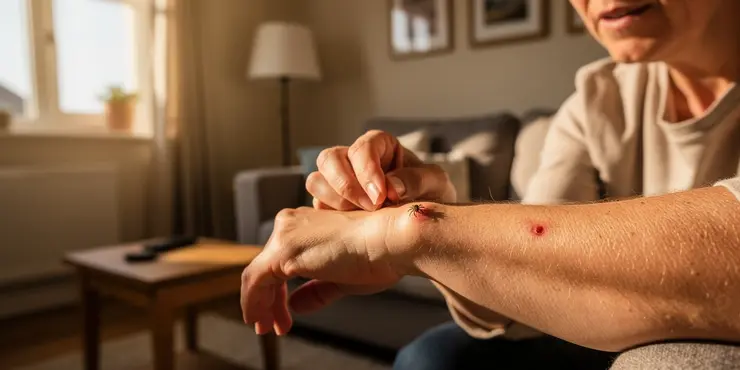
Tick Bites: Should you be worried?
Relevance: 42%
-

How long does a tick need to be attached to transmit Lyme disease?
Relevance: 40%
-

Are there any risks associated with untreated ADHD?
Relevance: 39%
-

Are there any complications associated with untreated BPH?
Relevance: 39%
-
What are the long-term effects of untreated eating disorders?
Relevance: 37%
-
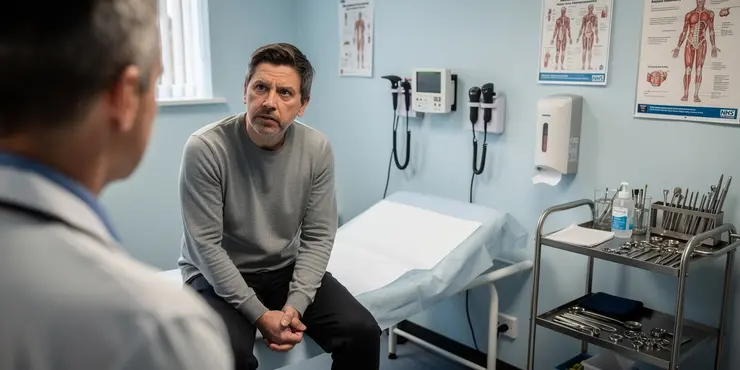
What happens if appendicitis is left untreated?
Relevance: 37%
-

What complications can arise from untreated hypotony?
Relevance: 35%
-

Can gonorrhoea cause complications if left untreated?
Relevance: 30%
-

Symptoms of coeliac disease
Relevance: 29%
-

Living Well with Coeliac Disease
Relevance: 29%
-
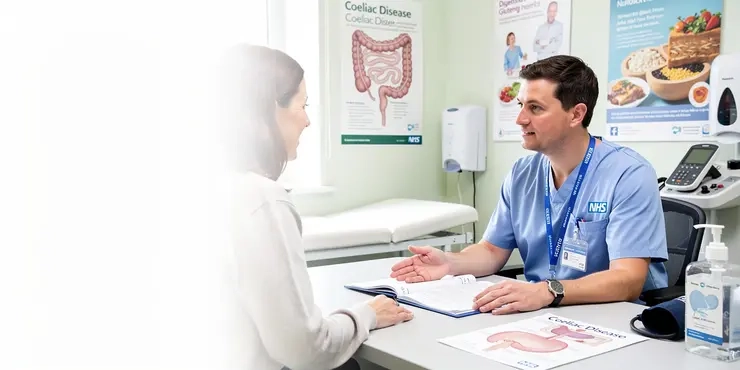
Coeliac Disease: Session 1: What is Coeliac Disease?
Relevance: 27%
-

What is a flesh eating disease?
Relevance: 27%
-
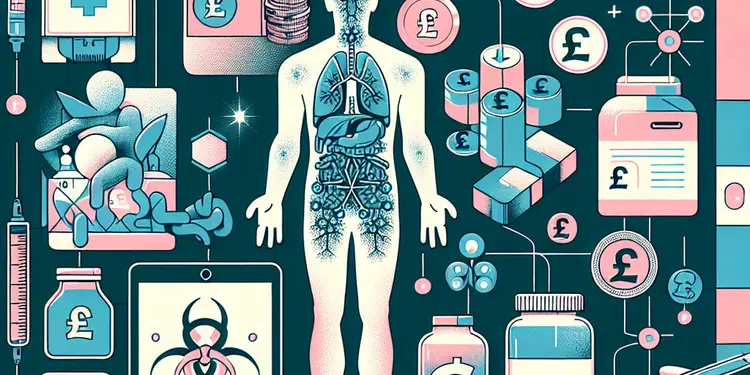
What are the symptoms of flesh-eating disease?
Relevance: 26%
-
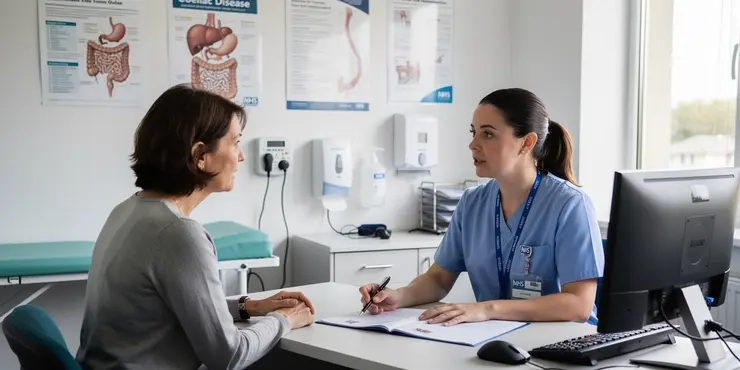
Diagnosing Coeliac Disease Updated 2021
Relevance: 26%
-

Causes of coeliac disease
Relevance: 26%
-

Can screw worms cause zoonotic disease?
Relevance: 26%
-

What are the common symptoms of Crohn's disease?
Relevance: 26%
-
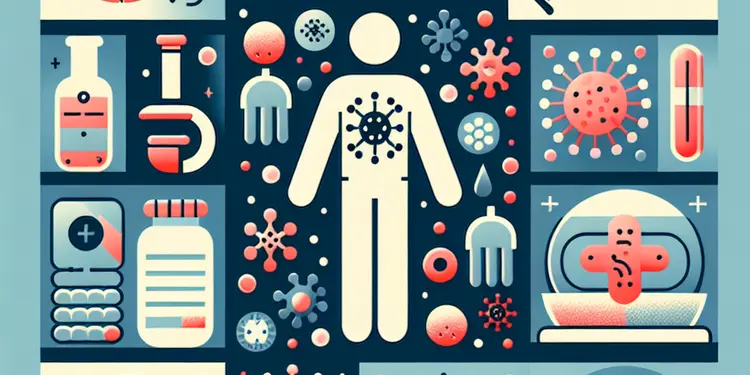
What causes flesh-eating disease?
Relevance: 26%
-
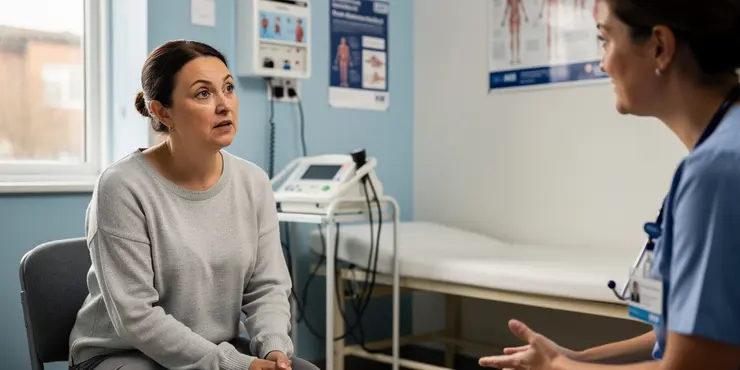
BSL Pelvic inflammatory disease (PID)
Relevance: 25%
-
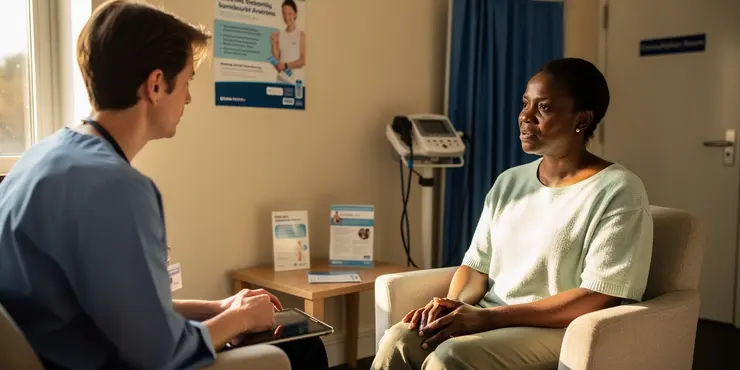
What are the complications of sickle cell disease?
Relevance: 25%
What is Lyme Disease?
Lyme disease is a bacterial infection transmitted to humans through the bite of infected black-legged ticks, often known as deer ticks. In the UK, these ticks are commonly found in woodland and heathland areas where they feed on wildlife, such as deer and rodents. The bacteria responsible for Lyme disease, Borrelia burgdorferi, can lead to a range of symptoms and health issues if not addressed timely.
Early Symptoms of Lyme Disease
Initially, Lyme disease often presents with a distinctive circular rash around the tick bite, commonly described as a "bull's-eye" rash. This generally appears 1 to 4 weeks after being bitten. Other early symptoms may include flu-like symptoms such as fatigue, headaches, fever, and muscle or joint pain. At this stage, Lyme disease can generally be effectively treated with antibiotics, which prevents further complications.
Consequences of Untreated Lyme Disease
If Lyme disease is not treated promptly, it can advance to more severe stages. The bacteria can spread to various parts of the body, leading to a host of complex and chronic symptoms. The disease is typically divided into stages: early localized, early disseminated, and late disseminated Lyme disease.
Early Disseminated Lyme Disease
Within weeks to months post-infection, untreated Lyme disease may progress to the early disseminated stage. At this point, the bacteria have begun to spread throughout the body. Symptoms can include additional rashes on other parts of the body, facial palsy, severe headaches, meningitis (inflammation of the brain or spinal cord), and pain and swelling in the joints. The nervous system and heart can also be affected, potentially causing palpitations, dizziness, or shortness of breath.
Late Disseminated Lyme Disease
Months to years later, untreated Lyme disease can lead to late disseminated symptoms, which are much more serious and long-lasting. Chronic joint inflammation, known as Lyme arthritis, can occur, mostly affecting the knees. Neurological problems are also common and may include cognitive difficulties, numbness or tingling in the hands or feet, and memory issues. In some severe cases, chronic Lyme disease can even result in debilitating fatigue and considerable impairments in daily function.
Prevention and Importance of Treatment
To avoid the severe consequences of untreated Lyme disease, early detection and treatment are crucial. In the UK, this involves being vigilant about tick checks after spending time in at-risk areas, using tick repellent, and seeking medical advice if symptoms appear. Proper antibiotic treatment at the initial stage usually results in a full recovery, underscoring the importance of early intervention to prevent the debilitating progression of this disease.
What is Lyme Disease?
Lyme disease is a sickness caused by tiny germs. People can get it if they are bitten by a tick that carries the germs. Ticks live in grassy and woody places, like forests. They like to feed on animals like deer and mice. The germs that cause Lyme disease are called Borrelia burgdorferi. If you get Lyme disease and don't take care of it, it can give you a lot of problems.
Early Symptoms of Lyme Disease
The first sign of Lyme disease is a special round rash where the tick bit you. It looks like a "bull's-eye." This rash shows up 1 to 4 weeks after the tick bite. You might also feel tired, have headaches, get a fever, or feel pain in your muscles and joints. If you have these symptoms, doctors can give you medicine called antibiotics to make you better.
Consequences of Untreated Lyme Disease
If you do not treat Lyme disease early, it can get much worse. The germs can spread in your body. Lyme disease has different stages. The early stage, when germs stay in one place. Then, early disseminated, when germs start spreading. Finally, late disseminated, when germs have spread a lot.
Early Disseminated Lyme Disease
If Lyme disease isn't treated, it can get worse in weeks or months. At this point, germs might spread in your body. You might get more rashes, have a droopy face, bad headaches, a stiff neck, or swollen and painful joints. It can affect your brain and heart, making you feel dizzy or have trouble breathing.
Late Disseminated Lyme Disease
If you don't treat Lyme disease for months or years, it can become very serious. You might get very painful and swollen joints, especially your knees. Your brain might not work right, making you forget things or feel tingling in your hands or feet. You might feel very tired and can't do things you usually do.
Prevention and Importance of Treatment
The best way to stop Lyme disease from getting worse is to treat it early. In the UK, you should check for ticks after being outside in risky areas. Use repellents to keep ticks away and see a doctor if you have symptoms. Getting the right medicine early can help you get all better. It's really important to see a doctor if you think you have Lyme disease.
Frequently Asked Questions
What happens to the body when Lyme disease is left untreated?
Untreated Lyme disease can cause severe symptoms, including joint pain, neurological problems, and heart issues.
How long can Lyme disease remain in the body untreated?
Lyme disease can remain in the body for months or even years if left untreated, potentially leading to chronic symptoms.
Can untreated Lyme disease become chronic?
Yes, untreated Lyme disease can result in chronic Lyme disease, characterized by persistent fatigue, muscle and joint pain.
What are the neurological effects of untreated Lyme disease?
Neurological effects can include memory problems, cognitive decline, facial palsy, and neuropathy.
Can untreated Lyme disease affect the heart?
Yes, it can cause Lyme carditis, leading to irregular heartbeats and potentially heart failure.
Does untreated Lyme disease affect mental health?
Yes, it can lead to anxiety, depression, and difficulty concentrating.
Are the symptoms of untreated Lyme disease reversible?
Early treatment is necessary to prevent permanent damage, but some symptoms may persist or be irreversible if treatment is delayed.
How does untreated Lyme disease affect joints?
It can cause arthritis, particularly in the knees, leading to swelling and pain.
Can untreated Lyme disease lead to other infections?
While Lyme disease itself doesn't cause other infections, the immune system may be compromised, increasing susceptibility.
Is there a time window to treat Lyme disease effectively?
Early intervention within the first few weeks is crucial for effective treatment and to prevent chronic symptoms.
What are the common signs of untreated Lyme disease?
Common signs include persistent rash, severe headaches, joint pain, and heart palpitations.
How does untreated Lyme disease affect daily life?
Patients may experience chronic fatigue, pain, and cognitive difficulties that impact daily activities and quality of life.
Can Lyme disease spread to other parts of the body if untreated?
Yes, the bacteria can spread throughout the body, affecting skin, joints, heart, and nervous system.
Does untreated Lyme disease affect children differently?
Children may experience similar symptoms but can also face developmental and learning challenges.
Is death possible from untreated Lyme disease?
Death is rare but possible, typically due to complications such as severe cardiac issues.
How is untreated Lyme disease diagnosed?
Diagnosis is typically based on symptoms and confirmed with laboratory tests, although it can be challenging once symptoms are chronic.
Can lifestyle modifications help manage symptoms of untreated Lyme disease?
Lifestyle changes such as diet, exercise, and stress management can help alleviate some symptoms but do not replace medical treatment.
What is post-treatment Lyme disease syndrome?
It refers to persistent symptoms experienced by some people after completion of antibiotic therapy for Lyme disease.
Are there alternative treatments for untreated Lyme disease?
Some people explore herbal and alternative remedies, but their effectiveness is not scientifically proven compared to antibiotics.
Can untreated Lyme disease trigger autoimmune conditions?
Chronic inflammation from untreated Lyme disease may increase the risk of autoimmune responses in the body.
What happens if Lyme disease is not treated?
If you don't treat Lyme disease, it can make you very sick. It can hurt your joints, brain, and heart.
How long can Lyme disease stay in the body without treatment?
Lyme disease is a sickness you can have for a long time if you don't get it treated. It can make you feel unwell for months or even years.
Can Lyme disease last a long time if not treated?
Yes, if you do not treat Lyme disease, it can turn into a long-lasting illness. This can make you feel very tired all the time and cause your muscles and joints to hurt.
What happens to the brain if Lyme disease is not treated?
Brain and nerve problems can make it hard to remember things. It might also get harder to think or learn. Sometimes, it can make parts of your face or body feel weak or not work right.
Can Lyme Disease Hurt Your Heart if Not Treated?
If Lyme disease is not treated, it can cause problems with your heart. This means your heart might not work properly.
Here are some tips to help understand more:
- Ask a doctor if you feel unwell.
- Read simple books or use pictures about Lyme disease.
- Use a computer or tablet to watch videos about Lyme disease.
Yes, it can make your heart beat in a funny way. It can also hurt your heart if it gets very bad.
Can Lyme disease make you feel unwell in your mind if not treated?
Yes, it can make you feel worried, sad, and hard to focus.
Can the signs of Lyme disease go away if you don't treat it?
It is important to start treatment early to stop lasting harm. But if treatment is late, some symptoms might stay or not change.
What happens to your joints if Lyme disease is not treated?
It can make your knees hurt and swell up. This is called arthritis.
Can Lyme disease cause other health problems if not treated?
Lyme disease does not make other infections happen. But it can make your body's defense system weaker. This might make it easier to get sick.
Can Lyme disease be treated quickly?
Getting help early, in the first few weeks, is very important. This way, treatment works better and it stops problems from lasting a long time.
What are the common signs of untreated Lyme disease?
Untreated Lyme disease can make you feel very sick. Here are some signs to watch for:
- Tiredness: You might feel very tired all the time.
- Pain: You could have sore muscles and joints.
- Headaches: Your head might hurt a lot.
- Fever: You might feel hot and shivery.
- Skin rash: Sometimes, you get a red rash that looks like a bullseye.
If you think you have these signs, it is important to see a doctor. A doctor can help you get better.
To help understand and remember this information, you can:
- Use charts or drawings to see the signs.
- Listen to a recording of this information.
- Ask someone to explain it to you in person.
Common signs are things like a rash that won't go away, really bad headaches, hurting joints, and feeling your heart beat really fast.
To help understand these signs better, you can:
- Use a picture dictionary to see what these words mean.
- Ask someone to explain the signs to you.
- Watch a video that talks about these signs.
- Use apps that read text out loud.
What happens if Lyme disease is not treated?
Lyme disease is an illness you can get from tick bites. It can make you feel tired and give you headaches. If you do not treat it, it can make you feel sick for a long time.
If Lyme disease is not treated:
- You might feel very tired.
- Your muscles and joints might hurt.
- It can be hard to remember things.
- You might feel sad or grumpy.
If you think you have Lyme disease, tell a doctor. They can help you feel better with medicine. You can also use a calendar to remind you to take your medicine. Ask someone you trust, like a family member or friend, to help you.
People might feel very tired all the time. They could have pain and find it hard to think clearly. This can make it tough to do everyday things and enjoy life.
If Lyme Disease is not treated, can it move to other parts of the body?
Yes, the germs can move around inside the body. They can cause problems with the skin, joints, heart, and brain.
How does Lyme disease affect children if not treated?
When Lyme disease is not treated, it can make children sick in different ways. Here’s what might happen:
- Children can get tired and feel weak.
- Some might have a fever or headaches.
- They can have pain in their joints or muscles.
- They might have trouble focusing or remembering things.
If you think a child has Lyme disease, it’s important to see a doctor. They can help make the child feel better with the right treatment.
Here are some ways to help children understand:
- Use short and clear sentences.
- Show pictures or videos to explain things.
- Ask the child if they have any questions.
Kids might have these problems, too. They can also have trouble growing and learning.
Can you die from Lyme disease if you don't get it treated?
Death can happen, but it is not common. It usually happens because of very serious heart problems.
How do doctors find out if someone has Lyme disease that hasn't been treated?
Doctors find out what is wrong by looking at the signs your body shows. They also do tests in a lab to be sure. If the signs last a long time, it can be harder to find out what is wrong.
Can changes in daily habits help with untreated Lyme disease?
Untreated Lyme disease is an illness you get from a tick bite. It can make you feel sick.
Changing some things in your daily life might help you feel a bit better. Here are some ideas:
- Eat healthy food like fruits and vegetables.
- Get plenty of rest and sleep at night.
- Try light exercises like walking.
- Drink lots of water.
It can also be helpful to:
- Ask a doctor or nurse for advice.
- Use a calendar or reminders to take medicine.
These changes might make you feel better, but it is important to talk to a doctor if you can.
Changing how you eat, moving your body, and calming your mind can help you feel better. But you still need to see a doctor for treatment.
What is Post-Treatment Lyme Disease Syndrome?
Some people still feel sick after treatment for Lyme disease. This is called Post-Treatment Lyme Disease Syndrome (PTLDS). It means even after taking medicine, they might feel tired or hurt. Doctors are still trying to learn why this happens.
Here are some tips to help understand and manage PTLDS:
- Use pictures or charts to help remember symptoms.
- Keep a diary of how you feel each day.
- Talk to a doctor if you still feel unwell.
Sometimes people still feel sick after they finish taking medicine for Lyme disease.
Are there other ways to help if Lyme disease isn't treated?
Some people try plants and other natural treatments to help them feel better. But we do not know for sure if these work as well as medicine from doctors, like antibiotics.
Can Lyme disease make your body attack itself if not treated?
If Lyme disease is not treated, it can cause swelling in the body. This swelling can make the body attack itself by mistake.
Useful Links
This website offers general information and is not a substitute for professional advice.
Always seek guidance from qualified professionals.
If you have any medical concerns or need urgent help, contact a healthcare professional or emergency services immediately.
Some of this content was generated with AI assistance. We’ve done our best to keep it accurate, helpful, and human-friendly.
- Ergsy carfully checks the information in the videos we provide here.
- Videos shown by Youtube after a video has completed, have NOT been reviewed by ERGSY.
- To view, click the arrow in centre of video.
- Most of the videos you find here will have subtitles and/or closed captions available.
- You may need to turn these on, and choose your preferred language.
- Go to the video you'd like to watch.
- If closed captions (CC) are available, settings will be visible on the bottom right of the video player.
- To turn on Captions, click settings .
- To turn off Captions, click settings again.
More Items From Ergsy search
-

What happens if Lyme disease is left untreated?
Relevance: 100%
-

What is Lyme Disease?
Relevance: 81%
-

Lyme disease: What is it?
Relevance: 80%
-

Is there a vaccine for Lyme disease?
Relevance: 76%
-

Is Lyme disease contagious between humans?
Relevance: 75%
-

Can Lyme disease be treated?
Relevance: 74%
-

What are common symptoms of Lyme disease?
Relevance: 73%
-

How effective are antibiotics in treating Lyme disease?
Relevance: 72%
-

How do you prevent Lyme disease?
Relevance: 69%
-

How is Lyme disease transmitted?
Relevance: 69%
-

Can pets get Lyme disease?
Relevance: 69%
-

What kind of ticks carry Lyme disease?
Relevance: 68%
-

What is the first sign of Lyme disease?
Relevance: 65%
-

Where is Lyme disease most commonly found?
Relevance: 65%
-

Can you get Lyme disease more than once?
Relevance: 65%
-

What tests are available for diagnosing Lyme disease?
Relevance: 64%
-

What is post-treatment Lyme disease syndrome (PTLDS)?
Relevance: 58%
-

Can Lyme disease cause long-term health problems?
Relevance: 47%
-

What types of antibiotics are typically used to treat Lyme disease?
Relevance: 42%
-

What is the mortality rate of untreated bubonic plague?
Relevance: 42%
-

Tick Bites: Should you be worried?
Relevance: 42%
-

How long does a tick need to be attached to transmit Lyme disease?
Relevance: 40%
-

Are there any risks associated with untreated ADHD?
Relevance: 39%
-

Are there any complications associated with untreated BPH?
Relevance: 39%
-
What are the long-term effects of untreated eating disorders?
Relevance: 37%
-

What happens if appendicitis is left untreated?
Relevance: 37%
-

What complications can arise from untreated hypotony?
Relevance: 35%
-

Can gonorrhoea cause complications if left untreated?
Relevance: 30%
-

Symptoms of coeliac disease
Relevance: 29%
-

Living Well with Coeliac Disease
Relevance: 29%
-

Coeliac Disease: Session 1: What is Coeliac Disease?
Relevance: 27%
-

What is a flesh eating disease?
Relevance: 27%
-

What are the symptoms of flesh-eating disease?
Relevance: 26%
-

Diagnosing Coeliac Disease Updated 2021
Relevance: 26%
-

Causes of coeliac disease
Relevance: 26%
-

Can screw worms cause zoonotic disease?
Relevance: 26%
-

What are the common symptoms of Crohn's disease?
Relevance: 26%
-

What causes flesh-eating disease?
Relevance: 26%
-

BSL Pelvic inflammatory disease (PID)
Relevance: 25%
-

What are the complications of sickle cell disease?
Relevance: 25%


